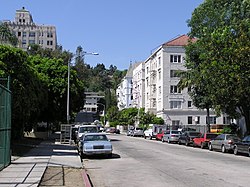Yucca Corridor, Los Angeles
| Yucca Corridor | |
|---|---|
| Neighborhood of Los Angeles | |

Cherokee Avenue
|
|
| Coordinates: 34°06′15″N 118°19′41″W / 34.104065°N 118.328071°W | |
| Country | United States |
| State | California |
| County | Los Angeles |
| City | Los Angeles |
| Time zone | PST (UTC-8) |
| • Summer (DST) | PDT (UTC-7) |
The Yucca Corridor is a '"formerly notorious" and "once crime-ridden" stretch of Yucca Avenue in Hollywood, California, north of Hollywood Boulevard and Mann's Chinese Theater. Today it is said to be "a hub for young professionals, artists, musicians and actors."
The Yucca Corridor Coalition of Property Owners and Managers delineates Yucca Corridor as bounded on the west by North Highland Avenue, on the north by Franklin Avenue, on the east by Vine Street and on the south by a line "just north of Hollywood Boulevard." In 2007 apartment condominiums were under development, but dwellers in the Corridor were mostly renters, and "mostly singles just starting their careers." In that year boutiques lined Yucca Street, which was described as "a trendy shopping spot hoping to rival Melrose Avenue" as a commercial center. Area nightclubs were said to "bolster the Yucca Corridor's thriving night life."
By 1993 the Corridor had been dominated for several years by the 18th Street Gang, according to Sharon Romero, leader of the Hollywood Beautification Team, which was formed to paint over graffiti, among other projects. She said gang members had "harassed us on the streets, pulled guns on us and kicked our paint cans over." Between May and July of that year the Los Angeles Police Department engaged in a concerted effort to rid the area of gang activity, including the use of additional police and Bureau of Tobacco and Firearms officers. A 1994 survey by the city's Falcon narcotics program said that the Corridor was one of L.A.'s most drug-infested neighborhoods. In 1995 the police were calling the area a "dope supermarket, . . . where cocaine dealers ruled the streets and residents hid behind their doors from gunfire after dark."
...
Wikipedia
